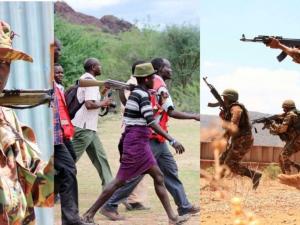
Kenyan troops to hunt down bandits in restive North Rift region
Kenya’s President William Ruto on Monday promised to act tough on insecurity in troubled areas of the North Rift region and other parts of the country, which have been hit hard by banditry attacks.
Speaking after meeting leaders from Baringo County at State House in Nakuru, Ruto ordered the Kenya Defence Forces (KDF) to conduct a joint security operation with the police in all banditry-prone areas starting Tuesday to combat lawlessness, which has hampered education and development and caused tensions among communities.
The government also gave a three-day amnesty for the surrender of firearms in the region.
“We must do whatever it takes to bring peace to banditry prone areas. We will do everything possible to weed out a few criminals who must stop or we will force them to stop,” said the Kenyan leader.
“The President has directed the KDF to work jointly with the police to weed out bandits in various places that have experienced cattle rustling and banditry in Baringo, Kerio Valley and other parts of the county,” a legislator who attended the meeting told the Nation.
Commitment to fight banditry
On Sunday, a tough-talking President Ruto reiterated his government’s commitment to fighting banditry, adding that the government will embrace new measures of fighting the vice.
In an effort to restore peace and security to the North Rift region, Ruto issued instructions for Interior Cabinet Secretary Kithure Kindiki to camp in the affected areas until sanity is restored.
“I know we have issues regarding security operations in North Rift. I have instructed Prof Kindiki to leave his office in Nairobi and camp in the North Rift until these citizens stop losing their lives,” Ruto said.
“With the government’s efforts, we will deal with them and ensure no Kenyan life is lost. We will deal with them ruthlessly,” he added.
The move comes amid increased incidents of banditry attacks. Last week, four police officers were killed in an ambush on the Kitale-Lodwar highway.
At least 12 other people, including seven police officers, are admitted to hospital with multiple bullet wounds. A sub-county police commander is among the injured. The attackers also burnt two police vehicles after looting them. Police said the officers were on patrol on the highway on Friday evening when they were ambushed near the Kenya Wildlife Services camp in Kaakong.
Teacher gang-raped
On Sunday night, an expectant teacher was gang-raped by armed bandits in Kainuk in Turkana South. Banditry has over decades caused untold suffering characterised by many deaths and injuries on the people of Kerio Valley in Elgeyo Marakwet and other affected counties including West Pokot, Baringo, Laikipia, Turkana and Samburu.
On November 14, 2022, a tough talking Prof Kindiki stood before journalists, saying that the government will smoke the bandits from their hideouts and bring down their financiers and those that buy stolen livestock.
On January 28, speaking in Arabal in Baringo County, Prof Kindiki promised to “move in and apply every human resource and weapon” the government has to smoke out bandits from their caves and forests.
This, as he assured residents that “learning in their schools will not be affected since the government is now deploying all its resources to ensure a return to normalcy”.
He added that, in the past six months, over 100 civilians and 16 police officers have been murdered with schools, churches and police vehicles burnt by bandits who have stepped up their attacks on civilians and security personnel.
The new anti-banditry force, known as the Land and Air Team (LAT), targets to drive out the bandits from their hideouts in gorges and valleys in the affected region.
Soft approaches
And, as the Kenyan government uses hard power to tame banditry, others feel that incorporating soft approaches could also help. This includes ending the illiteracy that is exploited by leaders and businessmen.
“The government can make it compulsory for children to attend boarding schools and are absorbed into the police service or military when they come of age as a long-term solution to this problem,” a police officer argued.
“Provision of basic services like security, water, hospitals, and roads could also go a long way in making the locals not feel neglected by the government and eliminate the need to purchase weapons to secure themselves,” he added.
In a bid to end insecurity in the region, the military is also setting up a buffer zone along the borders of Turkana and Marsabit by building barracks in the two counties.
https://www.theeastafrican.co.ke/tea/news/east-africa/deaths-as-banditry...
